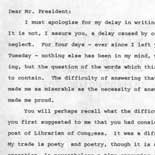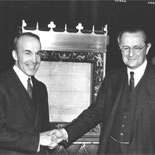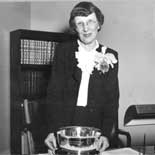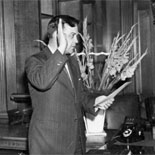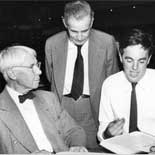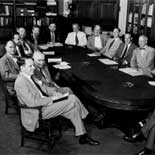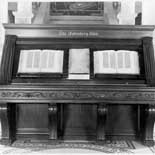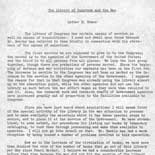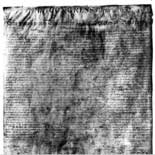Overview
Freedom’s Fortress: The Library of Congress, 1939-1953, contains a selection of 209 letters, memoranda, photographs, and publications (1,176 images) documenting a momentous period in the history of the Library of Congress when the institution underwent a myriad of changes that established it as one of America’s foremost citadels of intellectual freedom. During and shortly after World War II, Librarians of Congress Archibald MacLeish and Luther Harris Evans adopted new administrative procedures that improved the Library’s ability to acquire collections and to become a more vital resource both for Congress and the public. The selected documents are from four collections housed in the Library’s Manuscript Division: Library of Congress Archives and the personal papers of Supreme Court Justice Felix Frankfurter, Librarian of Congress Archibald MacLeish, and Manuscript Division Chief David C. Mearns.
Librarians MacLeish (October 2, 1939-December 19, 1944) and Evans (June 30, 1945-July 5, 1953) reevaluated and reconsidered the role of the Library of Congress vis-à-vis the nation’s information needs. MacLeish established the Library’s service canons, reorganized the Library, and placed its great resources at the disposal of the nation. Evans expanded services, increased emphasis on the acquisition program, and elevated the Library’s international role.
The two men had no doubts about the Library’s mission during their tenures. The Library of Congress became, in the words of Library employee Lucy Salamanca, a “fortress of freedom,” a beacon of knowledge and haven for the written word. In his foreword to Salamanca’s book, Fortress of Freedom: The Story of the Library of Congress (1942), which inspired the title of this online presentation, MacLeish wrote, “World events have made the Library of Congress more important now than it has ever been. Today it is, physiologically speaking, the nerve center of our national life… Every resource at its command is strained for national service to an extent neither possible nor necessary in the past.”
Archival Collections
The selected items, drawn from the Library of Congress Archives and other Manuscript Division collections, include correspondence, photographs, and other materials that provide a glimpse into the administration of the Library of Congress, the building of the Library’s collections, the Library’s outreach program, and the role of the Library’s staff. Significantly more documentation, however, can be found in the larger collections from which these items were selected.
The Library of Congress Archives, the primary collection, contains more than three million items tracing the history of the Library beginning in1800. Early records in the Archives include the correspondence of the Librarians of Congress from 1846 until 1940. This correspondence is complemented by the Central File, which spans the administrations of John Russell Young (1897-1899), Herbert Putnam (1899-1939), Archibald MacLeish (1939-1944), and Luther Harris Evans (1945-1953). The Archives also house fourteen volumes of General Orders—the official statements of Library policy and procedures. Annual accountings of the Library’s acquisitions, services, and other activities are found in the reports of individual Library divisions and departments. These accounts form the basis for the Librarian’s printed annual reports to the Congress. The Archives include a draft of The History of the Library of Congress, 1897-1939, prepared by Frederick B. Ashley, former Superintendent of the Main Reading Room (1915-27) and former Chief Assistant Librarian (1927-36), which records the development of the Library of Congress into a national library. Other items of special interest are the ledgers, receipts, and correspondence describing the construction of the Library’s Thomas Jefferson Building.
Three additional collections represented in this presentation are the personal papers of Felix Frankfurter, Archibald MacLeish, and David C. Mearns—important figures in the history of the Library of Congress. Their correspondence, diaries, memoranda, notes, speeches, and writings provide insight into the workings of the Library of Congress during the years covered by Freedom’s Fortress.
Rights And Access
The Library of Congress provides access to these materials for educational and research purposes and makes no warranty with regard to their use for other purposes. The written permission of the copyright owners and/or holders of other rights (such as publicity and/or privacy rights) is required for distribution, reproduction, or other use of protected items beyond that allowed by fair use or other statutory exemptions. There may be content that is protected as "works for hire" (copyright held by the party that commissioned the original work) and/or under the copyright or neighboring-rights laws of other nations. Responsibility for making an independent legal assessment of an item and securing any necessary permissions ultimately rests with persons desiring to use the item. See Legal Notices and Privacy and Publicity Rights for additional information and restrictions.
The Library of Congress would like to learn more about these materials and to hear from individuals or institutions having any additional information. Please contact us through our Ask A Librarian service.
Preferred Citation:
Researchers wishing to cite this collection should include the following information:
Freedom’s Fortress: The Library of Congress, 1939-1953, Manuscript Division, Library of Congress, Washington, D.C.
Permissions:
The Library of Congress has researched the contents of this collection to ascertain any possible legal rights embodied in the materials. Many of these items are in the public domain, that is, not subject to copyright protection under the laws of the United States. Items included in this collection with the permission of rights holders are listed below. For further use or reproduction of those items contact the rightsholders listed.
Photograph, Alice in Wonderland Manuscript Presented to British Museum by Luther Harris Evans, undated, made available here with permission from ZUMA Press. Suite 308, 1100 S. PCH, Laguna Beach, California 92651
Photograph of Joseph Auslander, undated, made available here with permission from Bachrach Studio. 321 S. Washington Street, Alexandria, Virginia 22314
Letter from W. Somerset Maugham to Archibald McLeish, July 6, 1945, made available here with permission from A.P. Watt Ltd. 20 John Street, London, WC1N2DR, United Kingdom
Letter from Marianne Moore to Archibald MacLeish, March 13, 1944, made available here with permission from Marianne Craig Moore, Literary Executor for the Estate of Marianne Moore.
Photograph, Opening of the Lincoln Papers, undated, made available here with permission from WTOP. 3400 Idaho Avenue, NW, Washington, D.C. 20016
Letter from Allen Tate to Archibald MacLeish, April 23, 1943, made available here with permission from Helen H. Tate. 3922 Dorcas Drive, Nashville, Tennessee 37215
Expert Resources
- Finding Aid Archibald Macleish Papers 1907-1981
- Finding Aid David C. Mearns Papers 1830-1979
- Finding Aid Felix Frankfurter Papers 1846-1966
- Library Of Congress Web Guide To World War Ii Resources
- Great Depression And World War Ii Resources
- The History Of The Library Of Congress
- Manuscript Division Reading Room
